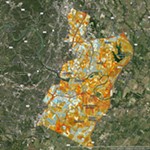Point Austin: A More Urgent Warning
National Climate Assessment amplifies the alarm
By Michael King, Fri., Nov. 30, 2018
Reading through the summations in the latest National Climate Assessment, I found my mind drifting inexorably to the Book of Revelation and its dire imagination of the judgments of heaven: "Woe, woe, woe to the inhabiters of the earth ...." The Bible's symbolic apocalypse of fire, flood, and famine increasingly sounds like our news of the day. Were the growing consequences confined to "unbelievers" (choose your designated villains), we could perhaps comfort ourselves at the eventual outcomes of our collective environmental neglect. Instead, the near-term effects are already landing first upon the most vulnerable regions and populations. In the mid- to long-term, none of us escape, and our descendants suffer the worst outcomes.
What might those be? Some selections from the report's introductory summary:
• "More frequent and intense extreme weather and climate-related events ... are expected to continue to damage infrastructure, ecosystems, and social systems."
• "Rising temperatures, sea level rise, and changes in extreme events are expected to increasingly disrupt and damage critical infrastructure and property, labor productivity, and the vitality of our communities."
• "The quality and quantity of water available ... are being affected by climate change, increasing risks and costs to agriculture, energy production, industry, recreation, and the environment."
• "Impacts from climate change ... increasingly threaten the health and well-being of the American people, particularly populations that are already vulnerable."
• "Rising temperatures, extreme heat, drought, wildfire on rangelands, and heavy downpours are expected to increasingly disrupt agricultural productivity ...."
• "Climate change will continue to degrade infrastructure performance ... with the potential for cascading impacts that threaten our economy, national security, essential services, and health and well-being."
• "Rising water temperatures, ocean acidification, retreating arctic sea ice, sea level rise, high-tide flooding, coastal erosion, higher storm surge, and heavier precipitation events threaten our oceans and coasts."
Here at Home in Texas ...
And so on. It's a distressing litany, and what's (relatively) new about this latest report – prepared by U.S. scientists undeferential to the political demands of the Trump administration – is that it emphasizes these effects are no longer predictions. Rather, they describe currently deteriorating environmental conditions under the pressure of global climate change. We don't have to look far for examples: The catastrophic California fires, amplified by drought and sustained by high temperatures, are the imminent case, but for Texans, Hurricane Harvey should be more than enough demonstration.
The report localizes its overall analysis, providing some of the following (selected) assessments for the "Southern Great Plains" (Kansas, Oklahoma, Texas):
• "The heaviest rainfall amounts from intense storms such as Harvey are about 5%-7% greater now than what they would have been a century ago."
• "By late in the 21st century ... the region is projected to experience an additional 30-60 days per year above 100°F."
• "The probable impacts of climate change for the Edwards Aquifer include a decrease of water supply during droughts, a degradation of habitat for species of concern, economic effects, and the interconnectivity of these impacts."
Overall, commented Luke Metzger of Environment Texas, "Texas will face increasingly dire consequences if action isn't taken to dramatically cut greenhouse gas emissions."
With All Deliberate Speed
"If action isn't taken": I've mostly elided that qualification and its variations in the report, written as it is in the careful style of officials (and others) trying to put their best face on a devastating prospect. The scientists from more than a dozen federal agencies work in the shadow of a White House that responds to unwelcome information with callous dismissals. "I don't believe it," was all Trump had to add to the discussion of the report, in the clumsy, vain hope that it might be largely ignored.
Austin gets a brief nod over the official reaction to our severe 2010-15 drought: "These impacts might have been even more severe had it not been for adaptation actions taken by the City of Austin, including implementation of drought contingency plans and water-use cutbacks in coordination with the City Council and community." After the recent floods, memories of the drought might be a little dim – the report makes clear that we can expect increasing cycles of drought and flood, "extreme weather" of various sorts, a volatile economy, and a diminished quality of life as regional weather turns less temperate, more extreme.
Texas Tech scientist Katharine Hayhoe, one of the report's many authors, offers an analogy to smoking: "It's as if we've been smoking a pack of cigarettes every day for decades," she told NPR. "But the time to stop smoking is now, and we absolutely can avoid the worst impacts if we act now. And that's what this report really lays out very clearly." She noted the explosive growth of renewable energy – despite the opposition of the fossil fuels industry and its many political sycophants. "So we are moving in the right direction," she concluded, "but we have to do so faster if we're going to avoid the truly dangerous impacts of a changing climate."
Bluntly, there is no more time to waste.
Got something to say on the subject? Send a letter to the editor.













